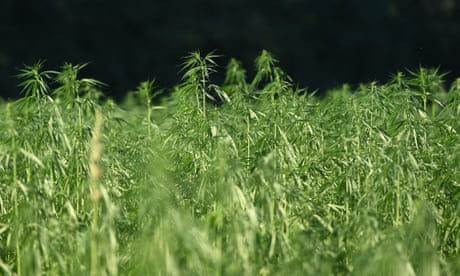- by foxnews
- 02 Feb 2025
Hemp: the green crop tied down by red tape in the US
Hemp: the green crop tied down by red tape in the US
- by theguardian
- 25 Feb 2023
- in politics

Ken Elliott runs a hemp oilseed and fiber processing facility in Fort Benton, Montana. His company, IND Hemp, grinds up the stalky plant so that it can be used for a variety of purposes, such as snacks, grain, insulation and paper. About 20 truckloads of spent biomass lie in heaps on his property.
Hemp industry advocates say this ban on livestock feed not only denies livestock farmers necessary relief, but is also denying the $80bn American feed sector an inexpensive product during a time of global grain shortages. And it is hindering a nascent green industry that could invigorate American agriculture while also saving the environment.
Industrial hemp is also a dream sustainable crop. It requires less water than similar plants and sequesters carbon. It can grow in nearly every climate, with up to two harvests a year. Hemp also regenerates the soil, absorbs toxic metals and it resists pests, mold and fire.
Nonetheless, hemp is highly regulated. Growers must be fingerprinted and background-checked. They must spend thousands of dollars for tests that prove their harvests contain less than 0.3% THC. Anything above that fraction must be destroyed.
Further burdens are placed on those seeking approvals for commercial hemp livestock feed. (So far none have been granted on the federal level.) Manufacturers complain that with only a dozen FDA officials processing requests, applicants can wait up to six months for a response or for questions, which when answered require further waits. The process can take years.
Regulators on both the state and federal levels defend the process, however. They say animals metabolize food differently from humans, so a person snacking on hemp seeds might process the ingredient differently than a goat subsisting on it every day.
While the US government treats hemp as a new product, it was historically a staple crop in America from the 1600s onwards, thriving especially in Kentucky. George Washington grew it. A draft of the Declaration of Independence was on hemp paper. But the 1937 Marihuana Tax Act debilitated the once-thriving industry, and then the 1970 Controlled Substances Act essentially killed it.
With decriminalization five years ago, the industry had to jumpstart from scratch.
This has cost the US market share in a global market estimated at more $4bn and expected to grow to over $17bn by 2030. Canada, China and Europe (particularly France) are big players. The US produced merely $824m worth of hemp in 2021, the last available figures.
Stakeholders say that the animal feed issue is particularly stymying the industry.
The only way around stringent federal restrictions is to win consent on the regional level, but the products cannot be transported or sold across state lines. Kentucky has approved feeding hemp-seed meal and oil to chickens and horses. In Montana, it can be given to non-production animals. Tennessee requires informing consumers in writing if hemp adulterants are added to feed.
The Wenger Group of Lancaster, Pennsylvania, managed to get state approval to sell feed for chickens. Wenger, which produces about 2m tons of feed a year, first had to invest $400,000 to do a hemp feed study on the nearby Kreider Farms involving 800 hens and 120,000 eggs.
Still, experts see hopeful baby steps and believe the first federal approval for egg-laying hens might come within a year.
The US Department of Agriculture (USDA) has granted millions of dollars for clinical studies into hemp as animal feed through its National Institute of Food and Agriculture office.
Panelists participating in the August webinar included scientists from universities across the country, including Texas, North Dakota, Ohio and Kentucky. They saw great potential for livestock, horses and fish.
Even if it won approvals for feed, the hemp industry must convince farms farmers to grow industrial hemp, says Bish. After the 2018 legalization, most hemp growers planted the CBD type. Many went bust due to an ensuing glut and are reluctant to pivot to industrial hemp even though it has more potential as a cash crop.
One reason is the paucity of processing facilities. What with soaring freight costs, the handful of facilities that are scattered across the country lie too far away for most farmers to transport the bulky product. Prospective processors baulk at investing in multimillion-dollar machinery without enough raw supply of hemp.
Hemp stakeholders are pinning hopes on Congress, which is due to renew the Farm Bill this year. They are lobbying for exemptions to make it easier to produce hemp fiber and grain, such as lifting the 0.3% THC limit. They also seek more Congressional funding to boost the number of FDA staff processing feed applications.
- by foxnews
- descember 09, 2016
Disney reveals fate of closed Star Wars hotel
The building that was formerly home to the Star Wars: Galactic Starcruiser at Walt Disney World in Orlando, Florida will be repurposed, the company confirmed to local media earlier this week.
read more





